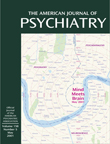Recurrent Depression With Vagus Nerve Stimulation
Mr. A was a 49-year-old Caucasian man who was admitted to a residential treatment facility in 1981. His medical background revealed a history of meningitis at age 1.5 years, with subsequent development of severe seizure disorder, developmental delay, and mental retardation. He was treated at our facility with combination antiepileptic drug therapy with limited success, and he developed the complication of drug-induced hyponatremia. He was successfully implanted with a Cyberonics Model 100 NCP Pulse Generator in 1999.In the next year, while still following his anticonvulsant medication regimen, he realized a 30% reduction in the number of seizures and an overall improvement in scores on measures of quality of life. However, he was admitted twice to the infirmary for a high level of passivity, withdrawal from others, diminished eye contact, and refusal to be involved in routine activities. He was nonverbal, had a diminished appetite, and exhibited weight loss, a subdued affect, and psychomotor retardation. The results of laboratory studies were unremarkable. His sodium level was 137 meq/liter; his phenytoin and carbamazepine levels were 13 μg/ml and 7 μg/ml, respectively. There was no apparent increase in his seizure activity.A review of his records revealed a history of similar episodes diagnosed as depression in 1982, 1984, 1987, 1990, and 1994; all were treated with amitriptyline, 75 mg/day, with apparently good results. There were no documented episodes of mania, and Mr. A’s mother knew of no family history of affective illness. During his most recent episode, Mr. A began treatment with extended-release venlafaxine, 37.5 mg/day, graduated increased to 75 mg/day, with good results. He ultimately returned to his cottage for further care after several weeks. The results of a follow-up examination showed him to be verbal, responsive to the examiner, eating well, and engaged in his usual daily activities.
References
Information & Authors
Information
Published In
History
Authors
Metrics & Citations
Metrics
Citations
Export Citations
If you have the appropriate software installed, you can download article citation data to the citation manager of your choice. Simply select your manager software from the list below and click Download.
For more information or tips please see 'Downloading to a citation manager' in the Help menu.
There are no citations for this item
View Options
View options
PDF/ePub
View PDF/ePubGet Access
Login options
Already a subscriber? Access your subscription through your login credentials or your institution for full access to this article.
Personal login Institutional Login Open Athens loginNot a subscriber?
PsychiatryOnline subscription options offer access to the DSM-5-TR® library, books, journals, CME, and patient resources. This all-in-one virtual library provides psychiatrists and mental health professionals with key resources for diagnosis, treatment, research, and professional development.
Need more help? PsychiatryOnline Customer Service may be reached by emailing [email protected] or by calling 800-368-5777 (in the U.S.) or 703-907-7322 (outside the U.S.).

